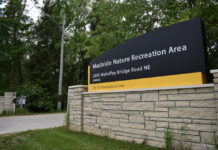Supporters of a Cedar Rapids casino will have another opportunity to develop a proposal for consideration by the Iowa Racing and Gaming Commission, after voters approved a referendum Nov. 2 that permanently authorizes gaming in Linn County.
A total of 24,169 Linn County voters (54.7%) cast ballots in favor of the referendum, while 20,036 (45.3%) were opposed. A simple majority was required for approval.
The Cedar Rapids Development Group (CRDG), and its nonprofit partner, the Linn County Gaming Association (LCGA), will now begin the process of applying for a gaming license with the state commission. If a license is granted, formal steps will be taken to develop a casino.
“The voters (Nov. 2) have shown they are ready to unlock Linn County’s potential,” Jonathan Swain, president of Peninsula Pacific Entertainment, the parent company of CRDG, said in a release. “Passing this referendum was the first step in our path to building a local casino.”
“A local casino will help our communities become a more vibrant place to live,” LCGA president Anne Parmley said in the statement. “A casino will bring millions of much-needed dollars in additional support to local nonprofits. We believe we can do more and be more.”
Unlike the costly, and sometimes contentious, lead-up to the last county-wide gaming referendum in 2013, no specific casino development proposals have been brought forward.
A casino location has also not yet been officially announced – the location of choice in 2013, along First Street West near the banks of the Cedar River, will now be the site of Kingston Landing, a $71 million development that will include a Big Grove Brewery, recreational facility and other housing and commercial facilities.
Mr. Swain said, however, that “we’ve always expressed a preference for (downtown) Cedar Rapids. We’ve evaluated half a dozen sites, and we still are focused on something that can help re-energize downtown Cedar Rapids.”
The Racing and Gaming Commission has twice rejected casino plans for Linn County, most recently in November 2017, when commissioners voted 3-2 against three separate casino proposals. Commissioners said at the time a new casino would excessively “cannibalize” gambling proceeds from established casino operations at the Isle of Capri in Waterloo, the Riverside Casino in Riverside and other state-licensed casinos in the region.
Supporters acknowledge that a new casino might, indeed, siphon some business from existing casino operations. But they say several factors have changed since the last proposal was rejected, which should improve the chances of receiving a casino license if the county referendum is approved.
“I think there’s a wider acceptance of gambling as a form of entertainment and revenue generation than there may have been in the past,” Ms. Parmley said in a post-vote interview. “A lot of dynamics have changed.”
The Linn Wins! Campaign has focused on shifts in the gaming market, an uptick in sports betting, and other factors that have altered the landscape for gaming ventures, including new gaming expansion laws passed in two bordering states – Nebraska to the west and Illinois to the east.
However, the gaming regulation landscape has changed at the state level since 2017 – the Racing and Gaming Commission has four new members and one open spot – but the commission hadn’t authorized a new casino license since 2010 when a license was granted for the Grand Falls Casino Resort in Larchwood. The commission has rejected several other proposals since then.
Other factors have changed as well. Last month, the (CRDG) signed a memorandum of understanding with the Cedar Rapids/Iowa City Building and Construction Trades Council outlining the intention to enter a project labor agreement once plans are developed for a local casino.
In addition, at an August presentation, P2E financial officer Natalie Schramm announced an agreement with the Linn County Gaming Association, the group would hold the license for any gaming venture. Under that agreement, Linn County nonprofit agencies would receive 8% of net revenue from a local casino – more than double the 3% allocation required by state law.
“I’m the eternal optimist,” Ms. Parmley added, “so I’m very hopeful that they’ll take a fresh look at Linn County and what (a casino) can provide both to Cedar Rapids and Linn County, as well as the state and overall gaming revenues.”





